09 Oct How can plant extracts protect your shrimp?
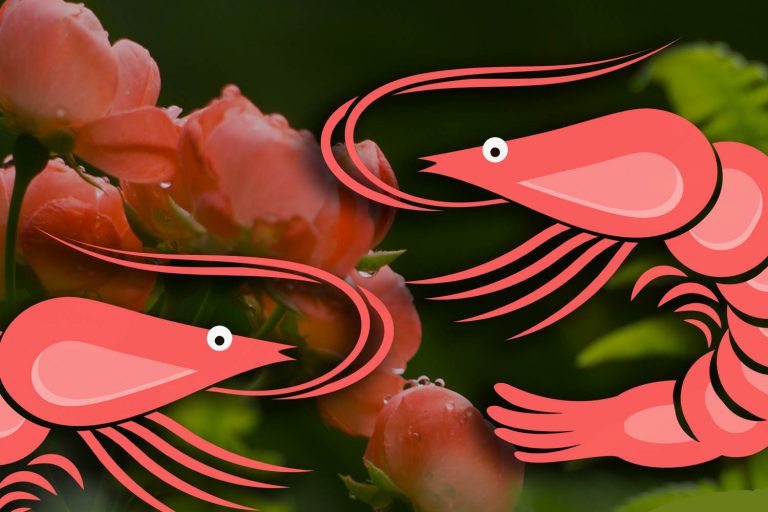
Global shrimp farming has grown very fast in the past 25 years. However, shrimps are very susceptible to illnesses and often the development of the industry is impaired by severe disease outbreaks.
Antibiotics, which have been used in large quantities in aquaculture farming, are in many cases ineffective, or result in increases in virulence of certain pathogens. Furthermore, they are cause for concern in promoting transfer of antibiotic resistance to human pathogens and for this reason there is increasing control on antibiotic use.
Plant extracts emerge as a natural alternative to antibiotics: they have been reported to stimulate appetite and promote weight gain, to act as immune-stimulants and to have antibacterial, anti-fungal and anti-viral and anti-parasitic properties.
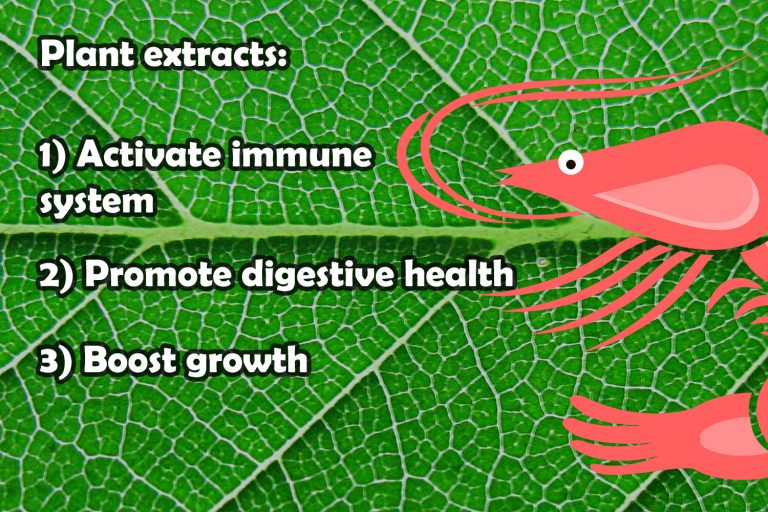
The importance of immunity
The immune system of the vertebrates is divided into two systems: innate immune system (the animals are born with this system fully developed, it is non-specific, provides immediate defense but not long lasting immunity) and adaptive immunity (this system develops during the life of the animal, it generates highly specialized antigens, takes time to respond but provides life time protection).
The current knowledge about the immune system of the shrimp is poor, but it is believed to be primitive and based mainly on the innate immune system.
Shrimp have an open circulatory system and there is no separation between the circulatory and lymphatic systems. The fluid within this open system is called hemolymph. Hemocytes are cells present in the hemolymph that play a major role in the immune response of shrimp to infections:
- They identify the pathogen by interacting of specific cell wall components of the invading organisms.
- They are involved in the regulation of different physiological functions that take place during infection, i.e., exoskeleton hardening, cuticle damage healing and coagulation.
- Activate mechanisms to control or remove the pathogens, like agglutination, phagocytosis, and production of free radicals and antimicrobial compounds.
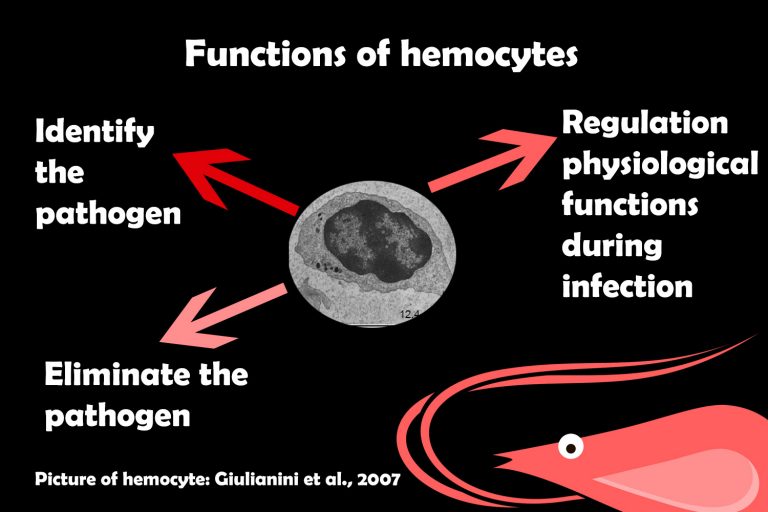
It is generally believed that shrimp are incapable of adaptive immune response, but it has been observed that over time shrimp populations develop a kind of resistance called “accommodation”, especially with viral infections: when a new virus surges, it causes a big mortality within the population but, in most cases, after a period of two years, the % survivability returns to normal, even if the virus persists in the farm. The biological mechanism of such “accommodation” is unknown.
However, the protection offered by “accommodation” is limited. Stressful situations, particularly low dissolved oxygen, low temperature or a sudden change in pH, increase the vulnerability of shrimp to disease.
Infections impose an energy cost on the shrimp. The generally declining performance of shrimp in Asia is attributed to the persistence of one or more viruses in the animals (88% of the shrimp in Asia are infected with one virus, 53% with two or more).
Plant extracts as immunostimulants
Immunostimulants are compounds that stimulate the non-specific defense mechanisms in shrimp. When there is immune stimulation, the amount of hemocytes circulating in the hemolymph increases.
Research has demonstrated that plant-derived compounds are powerful immune boosters in shrimp, increasing the count of hemocytes by more than 60% in healthy animals and by more than 30% during diseases.
Nowadays plant extracts with immune boosting capacity are used in shrimp farms worldwide to help to prevent diseases and, when diseases happen, to accelerate the recovery of the animals.
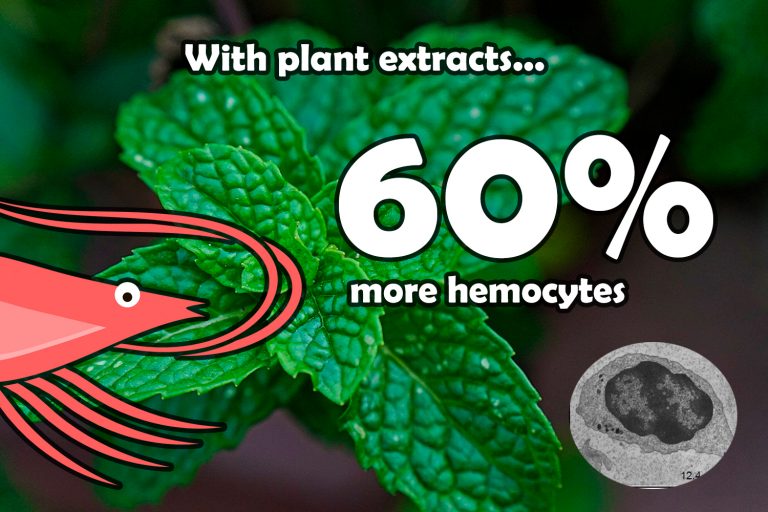
In practice, plant extracts can be useful in the following diseases:
1) Microsporidia: plant extracts contribute to the general health by boosting the immunity of the shrimp.
2) Gregarines and White Feces Syndrome: Plant extracts are able to eliminate the gregarines from a pond in 3 to 5 weeks.
3) Fungal infections (Fusarium sp) in juvenile and adults: plant extracts can be used to prevent and control fungal infections.
4) Diseases caused by Vibrio sp. (white gut disease, tail necrosis, red disease, loose shell syndrome, black shell disease, septic hepatopancreatic necrosis also called early morality syndrome, brown gill disease, swollen hindgut syndrome and luminous bacterial disease): Plant extracts are able to prevent and treat the infections by pathogenic Vibrio species and, in case of disease, reduce the mortality and improve the productive parameters.
5) Viral diseases (white muscle disease, white spot syndrome virus – WSSV-, etc): plant extracts are useful as a health enhancer in the prevention of diseases and help to reduce the mortality during outbreaks.
Gut health is key in shrimp
Shrimp are actively “grazing” on the substrate present in the bottom of the pond and therefore highly exposed to exchanges of microorganisms between the environment and the digestive system. This increases the risk for the proliferation of pathogenic gut flora, which can affect the functioning of the digestive system.
Furthermore, the digestive system of shrimp is the main entry port for bacterial, viral and parasitic infections, which are a major risk for the profitability of the farm.
Gastrointestinal tract colonization by microorganisms coming from the environment begins during the nauplius 5 stage. Since that moment until the end of the life of the shrimp, gut microbiota will have key functions for the health of the shrimp:
- Act as a first line of defense against potentially pathogenic microorganisms.
- Feed digestion: gut bacteria produce enzymes that help the shrimp to digest feed. Antibiotic treatments that kill beneficial bacteria result in a decrease of enzymatic activity in the intestine and in less feed use.
- Stimulation of the immune system.
- Promote proper development of the structure of the digestive tissues.
The transfer of shrimp (from the hatchery to the nursery or from the nursery to the growout pond), induces imbalance of gut microbiota and promotes the growth of opportunistic and pathogenic bacteria.
Promoting a stable, well-balanced gut microbiota since early life stages and during all life of shrimp is indispensable for maximizing production yield and economic results.
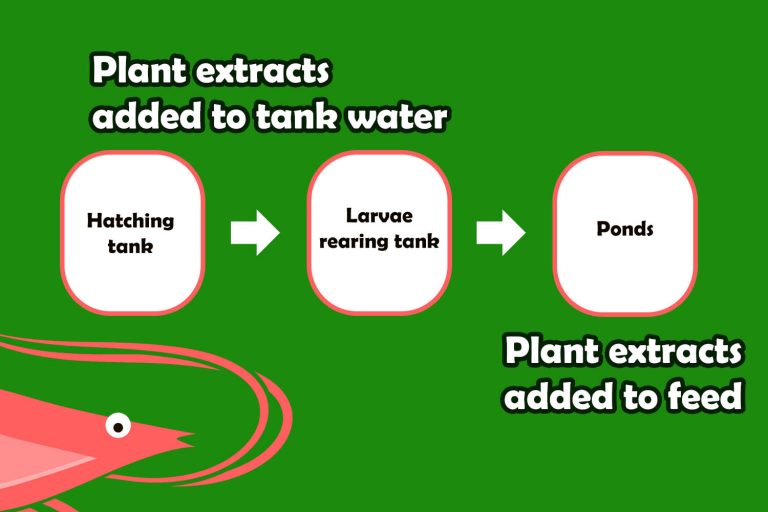
Practical application of plant extracts for gut health
1) As natural growth promoters
Application of plant extracts result in better productive parameters in the farm:
- Yield of the crop increased by 15-35%
- 16 to 44% improved survivability in healthy animals, and 35 to 78% survivability during certain diseases.
- 5-18% better final weight
- 3 to 10% better FCR
2) To replace antibiotic growth promoters and fulfill legal requirements
Plant extracts are the ideal solution to reduce or eliminate antibiotics and to be able to fulfill the food safety requirements.
Products of choice
AroMar©, highly concentrated premix powder that contains phytogenics and organic acids, to be added to aquaculture feeds.
PhytoAqua©, highly concentrated oral emulsion, based on phytogenics and medium chain fatty acids, to be added to feeds, ponds or water tanks.

Certain health statements may not be applicable in your region.

